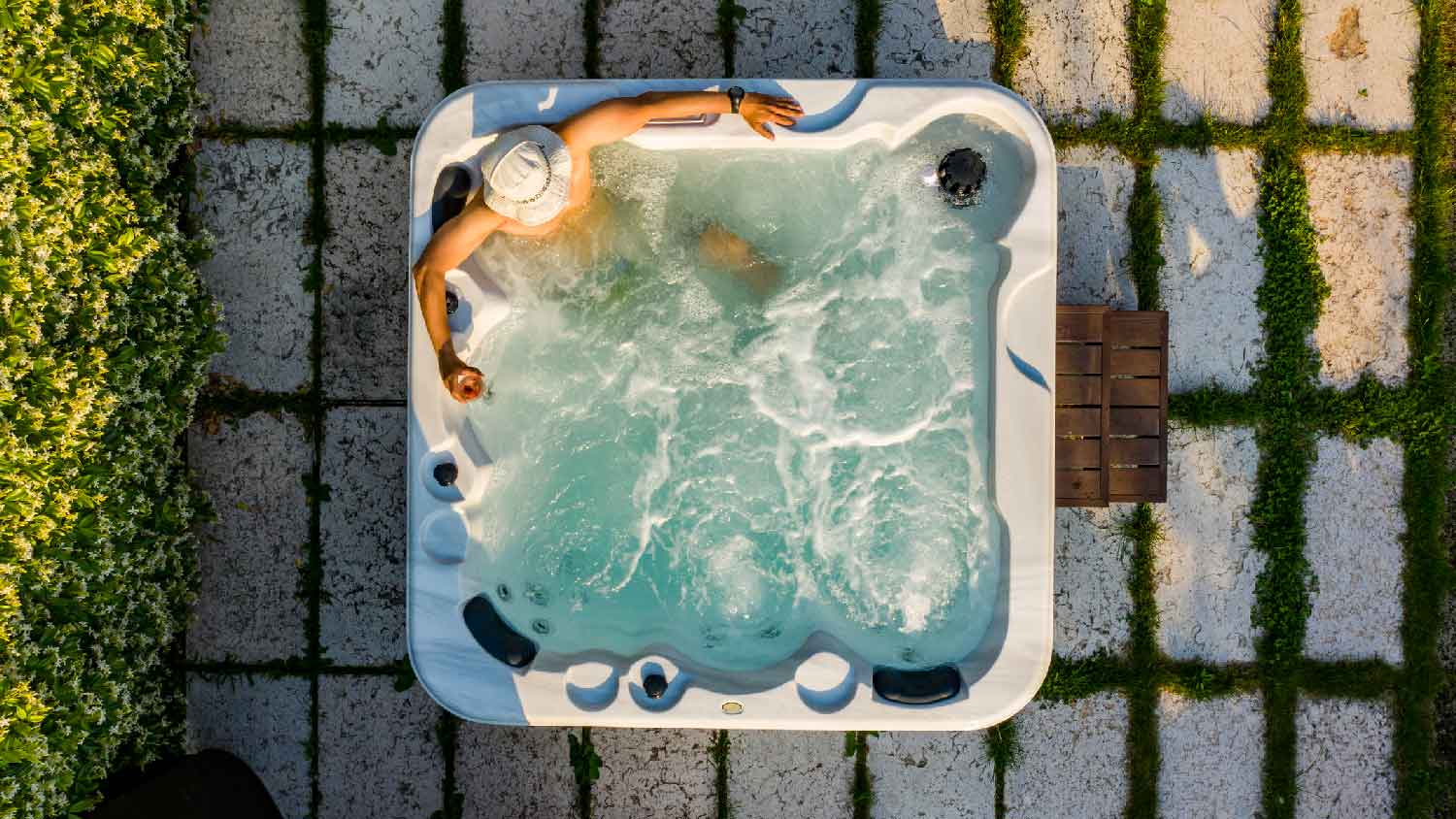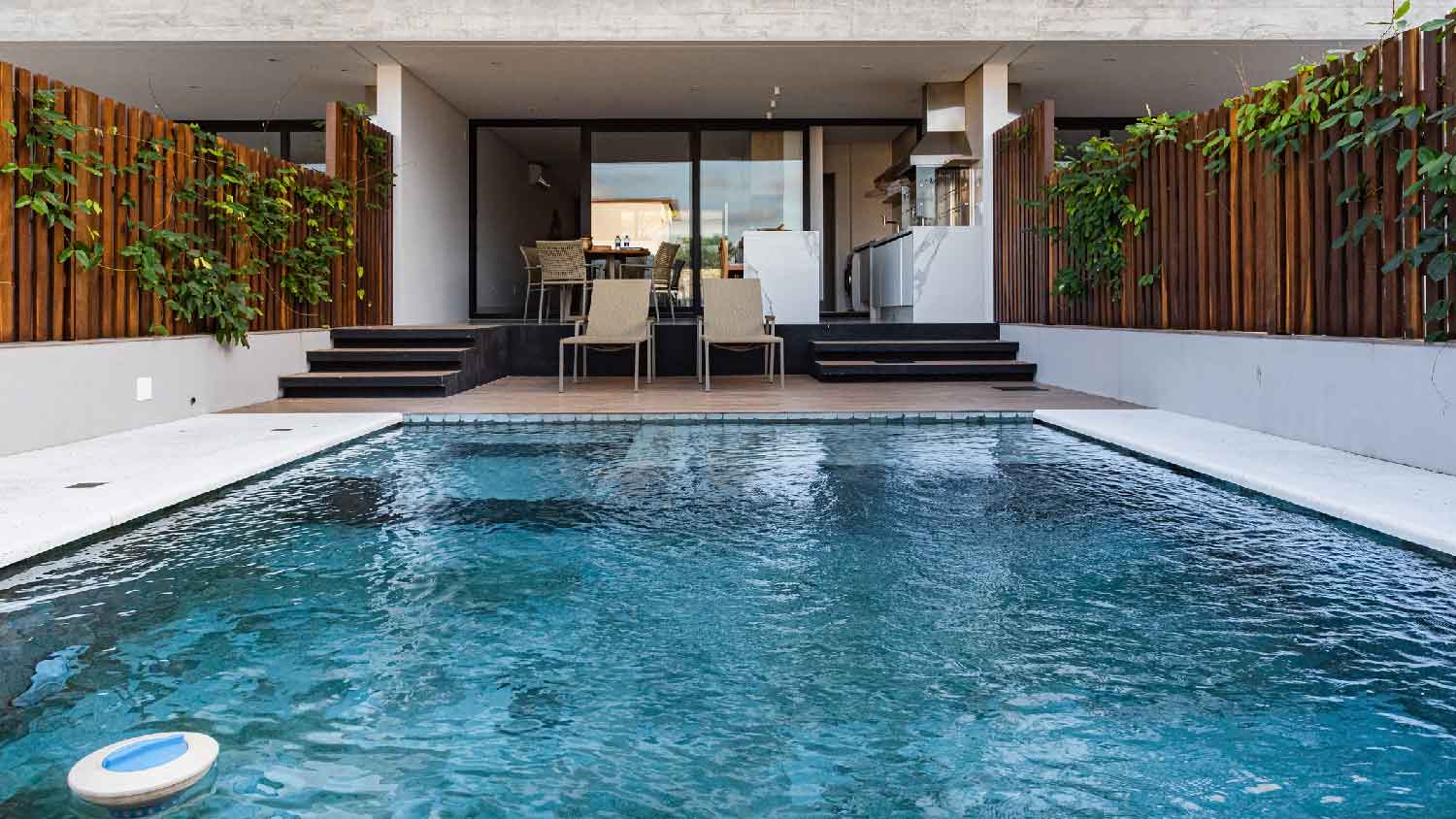
We could all use some relaxation, but we don’t always have the budget. This guide will show you how much an in-ground hot tub costs—no matter the build.
The best time to buy a pool is right at the end of the swimming season in most places


After much deliberation, you’ve finally decided to take the plunge and buy a pool. Once you determine what type of pool you want and where to put it, you’ll have to make another important decision by figuring out when exactly you should purchase and install your new pool.
The best time to buy a pool depends on multiple factors, including climate, your free time to supervise the installation process, contractors’ availability, and retailers’ stock. However, all things considered, the fall is almost always the very best time to buy a pool. Here’s why.
Since many people decide to install a pool in the spring to have it ready to go once the weather warms up, fewer people are thinking of buying a pool in the fall. However, pool companies and builders still need sales and work, so that’s where the discounts come in.
You may be able to find deep cuts on materials and supplies for above-ground and in-ground pools, as well as reductions on the costs of swimming pool heaters and the necessary fencing or pool enclosure materials. Even landscaping items may be on sale, allowing you to make the area around your pool really shine with rocks, plants, artificial grass, and more.
The cost of installing a pool near you might vary depending on several factors, including the style of the pool, the price of the material you choose, and any landscaping or extras you desire. However, all of the above will likely be less expensive in the fall, as manufacturers and sellers want to clear their inventory in advance of the new year.
What’s more, if you are thinking of financing your pool build or installation, interest rates could potentially increase in the new year. In this case, it is better to get started on the project and make your big purchases during the second half of the year.
Installing a pool is a big project and one that would be complicated to do yourself, even if you have some excellent DY skills. You’ll likely need the services of a local pool installation pro or general contractor to get things done, especially if you are adding an in-ground pool or have any other complicated features.
Even though spring and early summer tend to be the more popular times for pool builds and installations, pool contractors want and need work all year round. In the fall, they are more likely to be available, and you might get their undivided attention, which could be invaluable if you plan a more complex pool design.
Furthermore, pool specialists can likely still work throughout the fall or until the ground freezes, so labor might be available at a discount as their schedules open up. So, if you can wait until fall and plan ahead for next summer’s holidays and pool parties, you could save on labor, too.
The weather is particularly important if you are putting in an in-ground pool since you’ll likely need to dig out or evacuate a significant amount of dirt or soil.
In the autumn, the ground will likely be softer and drier after summer’s heat. Plus, since the soil will be less damp, the materials pros will use to build your new pool won’t sink into the earth and create deep ruts or otherwise damage the landscaping. Besides, even if they do, you’ll have all winter to let the yard recover.
If you are taking on the cost to fill in a pool or remove one completely, it is also best to do so before winter for the same reasons. The weather is more likely to cooperate, the ground is softer, labor is more readily available, and you can avoid the winterization and maintenance costs for a pool you want to remove anyway.
The caveat here is that weather can be unpredictable, so be sure to look at the forecast to get in before the first big freeze. You should also budget plenty of time for any weather delays.
Perhaps the most important reason fall is the best time to buy a pool is that you’ll have plenty of time to plan for the next summer. In most climates, you won’t be swimming much during the winter, and neither will anyone near you. You’ll likely be able to stock up on common pool accessories, like games, toys, new patio furniture, lounge chairs, and other fun stuff on the cheap. You can also take the time to upgrade your patio or deck to better align with your new pool.
Plus, the anticipation of next year’s fun will take the sting out of being unable to enjoy your newly installed pool right away.
The cost to build a pool ranges from $700 for a simple above-ground option to more than $100,000 for a luxury inground pool, with the average homeowner spending around $36,000 on a project like this. The cost to install a pool on your property depends on the type of pool you’re looking for, the heating and filtration systems you want to use, and any additional construction required, like a deck, fence, or pool shed.
The best way to determine your pool installation cost is to talk to a local pool professional you trust. Take a look around your area and be sure to check reviews so you can feel confident in your choice.
Unless you’re an experienced contractor, DIYing probably isn’t the way to save money on a pool. Here are a few tips that’ll help boost your budget.
You’ll save an average of $57,000 by building a pool above ground rather than inground. As long as your land is clear, level, and solid, there’ll be no digging or structural work required, and you won’t have to build the pool so much as set it up. You can get an above ground pool for $1,000 and skip the labor costs.
Most people only start thinking about adding a swimming pool in the summer months when they wish they were swimming. But it’s best to get this project started during the industry’s slower season—in the fall or winter—when you can find a good deal, and you’ll be all set to swim by the time those warmer months roll around.
That imported Moroccan tile may look incredible, but it will also add hundreds, if not thousands, to the cost of your pool installation. The more basic your pool, the more you’ll save. Consider where you can reduce your budget in size, water features, heating, and storage.
We have used Michiana water several times, they are very professional and knowledgeable of the services provided. I love the customer service/support. I have also referred them to family and friends.
Dalton came out right away to look at our fence project and provided the several different quotes that we requested very quickly. The company was priced competitively. Still, we decided to go with a cheaper contractor, and we now regret it. Save yourself the headache and hire a true pro like...
Andrew from Anytime Locksmiths South Bend was very polite and professional. He came on time, quickly replaced my bad door lock. He charged fairly, actually was low as compared with other regional locksmiths. You can trust the Anytime Locksmith which does honest business. I would recommend the...
Timely service, good response and completed work within the time given.
Owner set an appointment to go over pricing and services. Team was professional and work was excellent. Invoicing was accurate and will continue services.
Competitive quote,quick professional service. Very prompt on return calls and showed up at the time they said they would. Removed all debris and raked area and planted grass seed. Had 4 large trees removed in a very difficult area to access. Would definitely recommend this company to anyone...
Great quality of work and very professional service. On time and got the jobs done very efficiently.
Very poor professionalism and lack of common courtesy. Chris scheduled a time to come see our deck for a quote, but never showed, never answered my voice mail, and only after 10 days did he answer an email. He then showed promptly--albeit on a Sunday--to give us a quote, which is he turned...
Their are times, as a customer, you get lucky and find a business that dose what they say they are going to do and they did. Great people and easy to work with. I will most certainly use Sky’s tree service again and so should you.
The service providers were friendly, knowledgeable and very prompt.
From average costs to expert advice, get all the answers you need to get your job done.

We could all use some relaxation, but we don’t always have the budget. This guide will show you how much an in-ground hot tub costs—no matter the build.

Hot tub repair costs will depend on the type and severity of the issue. Our cost guide will help you decide whether to DIY or hire a professional.

Swim spa costs vary, but each unit offers the benefits of a pool and hot tub combined. Use this guide to plan your budget.

Does your hot tub have you seeing green? Get the answer to "why is my hot tub green" and find out how to get the water back to normal.

When you go for a dip in your pool, it should be refreshing, not slimy. Get answers to "why is my pool slimy" and find out how to fix it.

A warm soak can renew your spirits, but your hot tub occasionally needs a refresh. This guide will help you decide whether to replace or refurbish your hot tub.